Merry Christmas, or whatever solstice festival you are celebrating! We are now in the happy phase of relaxing after the "active" part of the holiday. No one at home is actually believing, but nevertheless we like the tradition to set up a Christmas tree, to put presents for the kids under it, to invite relatives for a plentiful tasty dinner and then to rest with full stomachs and cautious hopes for the next year. To me, this is the spirit of Christmas.
The spirit of Christmas includes also helping people in need. I like this part less. A major reason for not liking it is that those in need, or their agencies, try to track down the helping people and to harass them with never-ending demands for more help. For example, there is a poor lonely man in our district who lives by collecting bottles and other recyclable items from the garbage. Though I disapproved his drinking, I had some sympathy for him because of his love to animals. He had "adopted" a stray dog and we gave him bones to feed it. Then some neighbors poisoned the dog and he was devastated. "Those dirty, nasty Gypsies!", he exclaimed, though he himself belongs to this minority. After that, he tried to bring up a litter of stray cats. He asked me for milk to feed them, and I bought some. Then, he asked me to buy also a bread for him... Briefly, he asked more and more from me, until I set a fixed sum of 10 leva (EUR 5) per month. But even now, he routinely "forgets" that he has received the money and asks for more before the month is over.
In early December, when that man approached me, I had no bill of 10 leva, only of 20 leva. I sighed, gave him one and said that the extra money was for Christmas. He seemed happy. But yesterday, while I was on last-minute shopping, he asked for money and tried to convince me that I had promised to give him for Christmas. I told him that I had given him Christmas money weeks before and that there was apparently a misunderstanding. I don't know how he felt, but I was angry.
I had another experience of the same type with some students. During the last 4 months, my duties included holding a lecture course at a college loosely affiliated with my university. This work is so unwanted that we literally throw lots about who is to do it. Last year, a colleague picked the losing lot. This year, it was me. I tried to do the work as well as I could, and I invested much time to prepare the course. I even began to like it and thought that I could take it voluntarily the next year.
The exam was last Thursday. Just before it, the students gave me a nice Christmas card. I thanked them though I actually disliked this attempt to predispose me to be too generous. One of the students, who had attended the lectures regularly, approached me and asked me in a low voice whether there would be a bonus for regular attendees. I said that I hoped the regular presence would result in better test scores. So the exam began.
The results were a blow not only to many of the students but to me as well. Colleagues who had participated in the course the previous year had warned me that the level of these students was very poor, but I still didn’t expect 20 out of 50 students to fail, after we put the threshold at just 4 correct answers out of 15. After the exam, the failing ones (who included most regular attendees) were very unhappy, esp. those with 3 correct answers: “Only because of 1 score! Couldn’t you ask us additional questions (to reconsider the grade)?” I pointed out that it was not just 1 but 12 scores that they had got wrong. Then they went to complain to their administration, but were told to study harder.
Yesterday, as I opened my e-mail to send and read Christmas greetings, I saw a message from those students, about whether we could do the exam in February instead of September. They had my e-mail, because I had used it to send them the teaching materials I had prepared for them. And now they were using it to write me that I should write to the Dean to fix a date for the second exam in a month which, according to the rules of our university, is not meant for exams at all. It seems that the less productive a person is, the more prone he is to demand things from others.
So, when a friend at a forum asked about what New Year Resolutions we had, I could present only one: to make sure that someone else troubles with this course next year.
The spirit of Christmas includes also helping people in need. I like this part less. A major reason for not liking it is that those in need, or their agencies, try to track down the helping people and to harass them with never-ending demands for more help. For example, there is a poor lonely man in our district who lives by collecting bottles and other recyclable items from the garbage. Though I disapproved his drinking, I had some sympathy for him because of his love to animals. He had "adopted" a stray dog and we gave him bones to feed it. Then some neighbors poisoned the dog and he was devastated. "Those dirty, nasty Gypsies!", he exclaimed, though he himself belongs to this minority. After that, he tried to bring up a litter of stray cats. He asked me for milk to feed them, and I bought some. Then, he asked me to buy also a bread for him... Briefly, he asked more and more from me, until I set a fixed sum of 10 leva (EUR 5) per month. But even now, he routinely "forgets" that he has received the money and asks for more before the month is over.
In early December, when that man approached me, I had no bill of 10 leva, only of 20 leva. I sighed, gave him one and said that the extra money was for Christmas. He seemed happy. But yesterday, while I was on last-minute shopping, he asked for money and tried to convince me that I had promised to give him for Christmas. I told him that I had given him Christmas money weeks before and that there was apparently a misunderstanding. I don't know how he felt, but I was angry.
I had another experience of the same type with some students. During the last 4 months, my duties included holding a lecture course at a college loosely affiliated with my university. This work is so unwanted that we literally throw lots about who is to do it. Last year, a colleague picked the losing lot. This year, it was me. I tried to do the work as well as I could, and I invested much time to prepare the course. I even began to like it and thought that I could take it voluntarily the next year.
The exam was last Thursday. Just before it, the students gave me a nice Christmas card. I thanked them though I actually disliked this attempt to predispose me to be too generous. One of the students, who had attended the lectures regularly, approached me and asked me in a low voice whether there would be a bonus for regular attendees. I said that I hoped the regular presence would result in better test scores. So the exam began.
The results were a blow not only to many of the students but to me as well. Colleagues who had participated in the course the previous year had warned me that the level of these students was very poor, but I still didn’t expect 20 out of 50 students to fail, after we put the threshold at just 4 correct answers out of 15. After the exam, the failing ones (who included most regular attendees) were very unhappy, esp. those with 3 correct answers: “Only because of 1 score! Couldn’t you ask us additional questions (to reconsider the grade)?” I pointed out that it was not just 1 but 12 scores that they had got wrong. Then they went to complain to their administration, but were told to study harder.
Yesterday, as I opened my e-mail to send and read Christmas greetings, I saw a message from those students, about whether we could do the exam in February instead of September. They had my e-mail, because I had used it to send them the teaching materials I had prepared for them. And now they were using it to write me that I should write to the Dean to fix a date for the second exam in a month which, according to the rules of our university, is not meant for exams at all. It seems that the less productive a person is, the more prone he is to demand things from others.
So, when a friend at a forum asked about what New Year Resolutions we had, I could present only one: to make sure that someone else troubles with this course next year.




